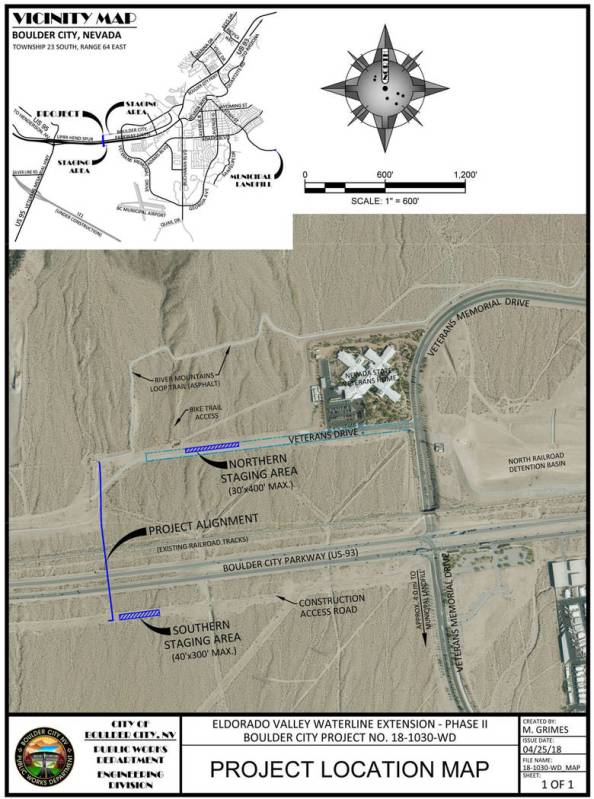
Despite seeming like a new project, the groundwork for the Eldorado Valley waterline extension began almost 16 years ago.
According to city documents, the project was part of water service contract with Solargenix LLC that began Nov. 4, 2003, through resolution 4196. Currently, this solar development area is Copper Mountain Solar 4 LLC run by Con Edison Clean Energy Business.
Boulder City Public Works Director Keegan Littrell said the city completed the waterline extension for two reasons.
“The why is to meet our obligation to the solar company and the second line provides redundancy/backup for the existing line during times of maintenance and in case of emergencies — once complete and placed in service,” he said.
The new line goes from the Southern Nevada Water Authority raw waterline near the interchange for U.S. Highways 93 and 95 to the Silver State materials site.
Littrell said phase one of the project was awarded by City Council on June 12, 2018, and finished June 14, 2019. Phase two was completed in May and council approved the final acceptance, payment and release of bonds for that phase at its June 25 meeting.
He said as of July 18, the city has spent approximately $2.36 million on both phases, but the total could change because construction on the first phase is done but has not been closed out yet. At the June 25 council meeting, he estimated it would end up costing $2.5 million or $2.6 million.
Acciona Solar Power, which took over the solar project from Solargenix, gave the city $2 million instead of constructing the line itself, and the city had to pay the difference.
“The funding from the solar company was provided to the city in 2009,” Littrell said. “When the recession occurred the project was not started due to other higher-priority projects. Now that the economy has recovered, the project was moved forward.”
The money spent by the city on the waterline extension comes from the utility fund capital improvement program.
“It was originally anticipated that there was a phase three to get down to basically the training facility … . We’re reviewing those contracts right now to make certain it’s our obligation to get all the way down there,” said Littrell to the City Council on June 25.
Littrell said he estimates staff will complete the review in August.
At the June 25 meeting, Mayor Kiernan McManus said he had heard from the solar company that was planning to begin a project in the area and was told it felt it had a “sufficient amount of water in making arrangements with the company that has the rights to the existing line.”
“I’m glad you’re taking the time to look into this more fully because the inference of this has been that the intent was to get the line where it is now for purposes other than what the solar company originally requested,” McManus told the staff.
If the city has to extend the line farther, it could cost $3 million to $4 million more. Currently, it stops at Interstate 11.
The waterline extension also included the installation of fire hydrants.
“They are for transportation hazards, protection along U.S. Highway 95 where accidents can and do occur, and it’s a mechanism for flushing the waterline for water-quality management,” Littrell said. “They also meet the 2012 International Fire Code and Uniform Design &Construction Standards for potable water system requirements.”
According to that code, fire hydrants are not mandatory unless they are specifically referenced in an adopting ordinance.
Contact reporter Celia Shortt Goodyear at cgoodyear@bouldercityreview.com or at 702-586-9401. Follow her on Twitter @csgoodyear.